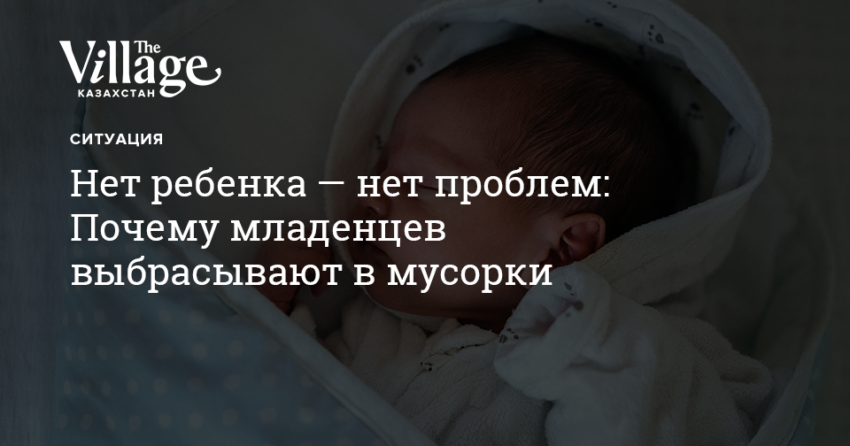At the same time, according to Dzhakubekova, the number of lives saved by baby boxes is much higher than the number of children actually left in them. She notes that cameras installed inside the boxes have recorded dozens of times how women opened the box, intending to leave their child there – but changed their minds and left after reading the brochures inside with information about crisis centers and hotlines.
We also couldn't find any studies or statistics to support the theory that baby boxes encourage parents to abandon their newborns. However, experts in the US, where baby boxes have become popular since the federal right to abortion was repealed, say that the number of abandoned babies is decreasing in states where the boxes operate.
South Korea's experience also shows that the presence of baby boxes does not have a significant impact on the number of abandoned babies. Thus, from 2014 to 2018, about 200 children were abandoned in the country's baby boxes annually. Then the number began to gradually decline: 170 in 2019, 113 in 2021, and 106 in 2022. Experts attribute the decline to the fact that in 2019, South Korea legalized abortion by a court decision. At the same time, although baby boxes did not affect the number of abandoned children, they certainly helped save many lives.
Talking "about it"
The problem of unwanted pregnancy usually divides people into two camps. Some advocate sex education for teenagers, others advocate abstinence. Apparently, the Ministry of Education of the Republic of Kazakhstan belongs to the second group. In February of this year, the first vice-minister of education Natalia Zhumadildayeva publicly stated that sex education will not be introduced in the country's schools.
“There are some things that a mother or father should convey to a child first and foremost,” she told reporters.
But the Ministry of Health is still conducting informational work – though not with schoolchildren, but with those who are already expecting a child.
— Prevention of orphanhood in the medical unit is strengthening the patronage of pregnant women and newborns, identifying cases of social distress and transmitting alarming signs to guardianship and child protection agencies. On the other hand, this is increasing the population's literacy in matters of sexual health, providing contraceptives to prevent unwanted pregnancy, providing examinations to pregnant women and other target groups to identify fetal malformations, pregravid preparation for pregnancy, that is, planning the pregnancy of a married couple, — the department told us.
The ministry also noted that over the past three years, the number of orphans in the country has decreased by 8.6% . However, it is unclear from these general statistics whether the number of newborns abandoned on the streets and in doorways has decreased in Kazakhstan.
Psychologist and sexologist Vladimir Aleksanin believes that the situation can be positively influenced not by the promotion of abstinence or conversations with those who are already pregnant, but by adequate sex education.
— Sex education is not even about sex. It is about boundaries and hygiene, about the ability to say “no” when you really don’t want to. About getting to know your body, why it changes, what hormones are, why new needs appear , what pregnancy is, among other things, but this is discussed at an older age. Children are told more about safety, about the body, — the psychologist explains.
According to the specialist, one should not hope that grown-up children will somehow find out everything themselves and learn how to use contraception with the help of the Internet. Knowing in general terms where children come from and realizing that a child may appear specifically for you are not the same thing.
— They don’t have a cause-and-effect relationship. They think that children are born to others who deliberately have sex for the purpose of conception, so that the sperm penetrates the egg and fertilization occurs. But this won’t happen to us, because my partner pulled out his penis in time. I hear this all the time. And I tell them that any unprotected sexual intercourse can lead to pregnancy. But they don’t understand this. And they want to have sex because there is a hormonal train that cannot be stopped by any prohibitions , — says Aleksanin.
Vladimir Aleksanin believes that all such things should be explained to teenagers in schools – it just needs to be done by specially trained people who will not be ashamed of frank conversations, but will be able to give clear and scientifically based answers, without blushing or shaming schoolchildren for excessive curiosity.
Parents, according to the psychologist-sexologist, should also take an active part in the child's sex education. But before telling children about something, they need to update their knowledge and, if necessary, consult with a specialist.
Scientists studying the impact of sex education on abortion rates and teenage pregnancy rates note that both indicators are reduced where schoolchildren are taught about human sexual development in an organized and competent manner. For example, a research group from the University of Washington came to this conclusion back in 2008.
At the same time, data shows that abstinence-only messages disguised as sex education don't work. States that use this approach have higher teen pregnancy rates than states that offer full sex education in schools.
